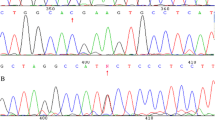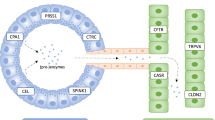Abstract
Background
The serine protease inhibitor Kazal type 1 (SPINK1), also known as pancreatic secretory trypsin inhibitor (PSTI), is a peptide secreted by pancreatic acinar cells. Genetic studies have shown an association between SPINK1 gene variants and chronic pancreatitis or recurrent acute pancreatitis. The aim of this study was to clarify whether the SPINK1 variants affect the level of serum PSTI.
Methods
One hundred sixty-three patients with chronic pancreatitis or recurrent acute pancreatitis and 73 healthy controls were recruited. Serum PSTI concentrations were determined with a commercial radioimmunoassay kit.
Results
Ten patients with the p.N34S variant, 7 with the IVS3+2T>C variant, two with both the p.N34S and the IVS3+2T>C variants, and one with the novel missense p.P45S variant in the SPINK1 gene were identified. The serum PSTI level in patients with no SPINK1 variants was 14.3 ± 9.6 ng/ml (mean ± SD), and that in healthy controls was 10.7 ± 2.2 ng/ml. The PSTI level in patients carrying the IVS3+2T>C variant (5.1 ± 3.4 ng/ml), but not in those with the p.N34S variant (8.9 ± 3.5 ng/ml), was significantly lower than that in the patients without the SPINK1 variants and the healthy controls. The serum PSTI level in the patient with the p.P45S variant was 4.9 ng/ml. Low levels of serum PSTI (<6.0 ng/ml) showed sensitivity of 80 %, specificity of 97 %, and accuracy of 96 % in the differentiation of IVS3+2T>C and p.P45S carriers from non-carriers.
Conclusion
Serum PSTI levels were decreased in patients with the IVS3+2T>C and p.P45S variants of the SPINK1 gene.


Similar content being viewed by others
Abbreviations
- BMI:
-
Body mass index
- CP:
-
Chronic pancreatitis
- RAP:
-
Recurrent acute pancreatitis
- SPINK1:
-
Serine protease inhibitor Kazal type 1
- PSTI:
-
Pancreatic secretory trypsin inhibitor
- ROC:
-
Receiver operating characteristic
- SD:
-
Standard deviation
References
Steer ML, Waxman I, Freedman S. Chronic pancreatitis. N Engl J Med. 1995;332:1482–90.
Etemad B, Whitcomb DC. Chronic pancreatitis: diagnosis, classification, and new genetic developments. Gastroenterology. 2001;120:682–707.
Whitcomb DC, Gorry MC, Preston RA, Furey W, Sossenheimer MJ, Ulrich CD, et al. Hereditary pancreatitis is caused by a mutation in the cationic trypsinogen gene. Nat Genet. 1996;14:141–5.
Masson E, Le Maréchal C, Delcenserie R, Chen JM, Férec C. Hereditary pancreatitis caused by a double gain-of-function trypsinogen mutation. Hum Genet. 2008;123:521–9.
Witt H, Luck W, Hennies HC, Classen M, Kage A, Lass U, et al. Mutations in the gene encoding the serine protease inhibitor, Kazal type 1 are associated with chronic pancreatitis. Nat Genet. 2000;25:213–6.
Pfützer RH, Barmada MM, Brunskill AP, Finch R, Hart PS, Neoptolemos J, et al. SPINK1/PSTI polymorphisms act as disease modifiers in familial and idiopathic chronic pancreatitis. Gastroenterology. 2000;119:615–23.
Chen JM, Mercier B, Audrezet MP, Raguenes O, Quere I, Ferec C. Mutations of the pancreatic secretory trypsin inhibitor (PSTI) gene in idiopathic chronic pancreatitis. Gastroenterology. 2001;120:1061–4.
Kume K, Masamune A, Mizutamari H, Kaneko K, Kikuta K, Satoh M, et al. Mutations in the serine protease inhibitor Kazal type 1 (SPINK1) gene in Japanese patients with pancreatitis. Pancreatology. 2005;5:354–60.
Aoun E, Chang CC, Greer JB, Papachristou GI, Barmada MM, Whitcomb DC. Pathways to injury in chronic pancreatitis: decoding the role of the high-risk SPINK1 N34S haplotype using meta-analysis. PLoS ONE. 2008;3:e2003.
Rosendahl J, Witt H, Szmola R, Bhatia E, Ozsvári B, Landt O, et al. Chymotrypsin C (CTRC) variants that diminish activity or secretion are associated with chronic pancreatitis. Nat Genet. 2008;40:78–82.
Rinderknecht H. Activation of pancreatic zymogens. Normal activation, premature intrapancreatic activation, protective mechanisms against inappropriate activation. Dig Dis Sci. 1986;31:314–21.
Bhatia E, Choudhuri G, Sikora SS, Landt O, Kage A, Becker M, et al. Tropical calcific pancreatitis: strong association with SPINK1 trypsin inhibitor mutations. Gastroenterology. 2002;123:1020–5.
Kereszturi E, Király O, Sahin-Tóth M. Minigene analysis of intronic variants in common SPINK1 haplotypes associated with chronic pancreatitis. Gut. 2009;58:545–9.
Aoun E, Muddana V, Papachristou GI, Whitcomb DC. SPINK1 N34S is strongly associated with recurrent acute pancreatitis but is not a risk factor for the first or sentinel acute pancreatitis event. Am J Gastroenterol. 2010;105:446–51.
Masamune A, Ariga H, Kume K, Kakuta Y, Satoh K, Satoh A, et al. Genetic background is different between sentinel and recurrent acute pancreatitis. J Gastroenterol Hepatol. 2011;26:974–8.
Ota Y, Masamune A, Inui K, Kume K, Shimosegawa T, Kikuyama M. Phenotypic variability of the homozygous IVS3+2T>C mutation in the serine protease inhibitor Kazal type 1 (SPINK1) gene in patients with chronic pancreatitis. Tohoku J Exp Med. 2010;221:197–201.
Ogawa M, Kitahara T, Fujimoto K, Tanaka S, Takatsuka Y, Kosaki G. Serum pancreatic secretory trypsin inhibitor in acute pancreatitis. Lancet. 1980;2:205.
Lasson A, Borgström A, Ohlsson K. Elevated pancreatic secretory trypsin inhibitor levels during severe inflammatory disease, renal insufficiency, and after various surgical procedures. Scand J Gastroenterol. 1986;21:1275–80.
Paju A, Stenman UH. Biochemistry and clinical role of trypsinogens and pancreatic secretory trypsin inhibitor. Crit Rev Clin Lab Sci. 2006;43:103–42.
Nakano I, Funakoshi A, Sumii T, Miyazaki K, Oogami Y, Kimura T, et al. Appearance mechanism and molecular heterogeneity of serum pancreatic secretory trypsin inhibitor (PSTI). Gastroenterol Jpn. 1985;20:354–60.
Satake K, Inui A, Sogabe T, Yoshii Y, Nakata B, Tanaka H, et al. The measurement of serum immunoreactive pancreatic secretory trypsin inhibitor in gastrointestinal cancer and pancreatic disease. Int J Pancreatol. 1988;3:323–31.
Kume K, Masamune A, Kikuta K, Shimosegawa T. [-215G>A; IVS3+2T>C] mutation in the SPINK1 gene causes exon 3 skipping and loss of the trypsin binding site. Gut. 2006;55:1214.
Király O, Wartmann T, Sahin-Tóth M. Missense mutations in pancreatic secretory trypsin inhibitor (SPINK1) cause intracellular retention and degradation. Gut. 2007;56:1433–8.
Boulling A, Le Maréchal C, Trouvé P, Raguénès O, Chen JM, Férec C. Functional analysis of pancreatitis-associated missense mutations in the pancreatic secretory trypsin inhibitor (SPINK1) gene. Eur J Hum Genet. 2007;15:936–42.
Ogawa M. Normal level and normal range of serum PSTI concentration. In: Kosaki G, Ogawa M, editors. Pancreatic secretory trypsin inhibitor. Tokyo: Igaku Tosho Shuppan; 1985. p. 91–3 (in Japanese).
Boulling A, Keiles S, Masson E, Chen JM, Férec C. Functional analysis of eight missense mutations in the SPINK1 gene. Pancreas. 2011;41:329–30.
Kuwata K, Hirota M, Shimizu H, Nakae M, Nishihara S, Takimoto A, Mitsushima K, Kikuchi N, Endo K, Inoue M, Ogawa M. Functional analysis of recombinant pancreatic secretory trypsin inhibitor protein with amino-acid substitution. J Gastroenterol. 2002;37:928–34.
Masamune A, Kume K, Takagi Y, Kikuta K, Satoh K, Satoh A, Shimosegawa T. N34S mutation in the SPINK1 gene is not associated with alternative splicing. Pancreas. 2007;34:423–8.
Tonouchi A, Ohtsuka M, Ito H, Kimura F, Shimizu H, Kato M, Nimura Y, Iwase K, Hiwasa T, Seki N, Takiguchi M, Miyazaki M. Relationship between pancreatic secretory trypsin inhibitor and early recurrence of intrahepatic cholangiocarcinoma following surgical resection. Am J Gastroenterol. 2006;101:1601–10.
Gaber A, Johansson M, Stenman UH, Hotakainen K, Pontén F, Glimelius B, Bjartell A, Jirström K, Birgisson H. High expression of tumour-associated trypsin inhibitor correlates with liver metastasis and poor prognosis in colorectal cancer. Br J Cancer. 2009;100:1540–8.
Paju A, Hotakainen K, Cao Y, Laurila T, Gadaleanu V, Hemminki A, Stenman UH, Bjartell A. Increased expression of tumor-associated trypsin inhibitor, TATI, in prostate cancer and in androgen-independent 22Rv1 cells. Eur Urol. 2007;52:1670–9.
Ozaki N, Ohmuraya M, Hirota M, Ida S, Wang J, Takamori H, Higashiyama S, Baba H, Yamamura K. Serine protease inhibitor Kazal type 1 promotes proliferation of pancreatic cancer cells through the epidermal growth factor receptor. Mol Cancer Res. 2009;7:1572–81.
Acknowledgments
This study was supported in part by a Grant-in-Aid from the Japan Society for the Promotion of Science (to K. Kume, to A. Masamune, and to T. Shimosegawa), and by the Research Committee of Intractable Pancreatic Diseases (Principal investigator: T. Shimosegawa), provided with funding by the Ministry of Health, Labour, and Welfare of Japan.
Conflict of interest
The authors declare that they have no conflict of interest.
Author information
Authors and Affiliations
Corresponding author
Rights and permissions
About this article
Cite this article
Kume, K., Masamune, A., Ariga, H. et al. Do genetic variants in the SPINK1 gene affect the level of serum PSTI?. J Gastroenterol 47, 1267–1274 (2012). https://doi.org/10.1007/s00535-012-0590-3
Received:
Accepted:
Published:
Issue Date:
DOI: https://doi.org/10.1007/s00535-012-0590-3




